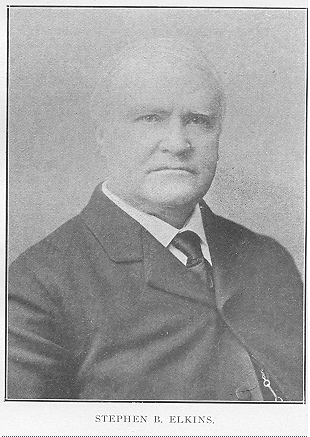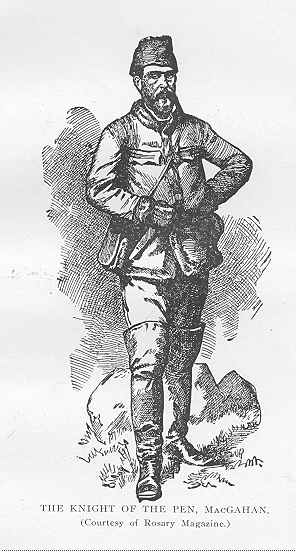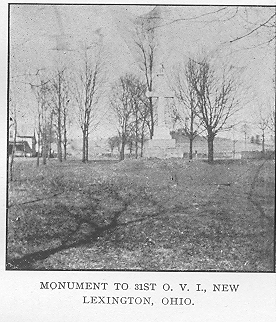
HISTORY OF PERRY COUNTY - 125
Perry County in War.
Our county need not be ashamed of her war record. In every war in which our country has been engaged, except the Revolution, Perry county has furnished her quota. Beneath her sod rests men who were participants in that first great struggle of ours in which we secured our independence.
Quite a number of the first settlers in the county were Revolutionary soldiers. Christian Binckley, of whom mention has already been made, came from Maryland, Where he had rendered important service to his country.
Wm. Dusenberry, the first settler in Madison township, served in the army under Washington.
Daniel Devore, buried in a little cemetery east of Corning, was also a member of the Continental army. There are quite a number of others especially in the north of the county.
During the War of 1812, Perry county, as such did not exist. The men who enlisted from here were accredited to Fairfield. It is not known how many soldiers were in that war from Perry county, but a few are known. They were John Fowler, the first settler of Pike township ; John Lidey, of Reading and Henry Hazelton, of Saltlick.
When the Mexican War broke out, our citizens were not long in answering the call of President Polk for volunteers. Two companies were organized in this county under Captains Noles and Filler. These companies were taken. to the scene of the war but they were never in a pitched battle. They did some fighting with the guerilla troops only. There is one sur-
126 - HISTORY OF PERRY COUNTY.
vivor of this War in Perry County, Air. Joel Spohn, of Reading.
When the news of the fall of Fort Sumter came to New Lexington, Lyman J. Jackson, who was then Prosecuting Attorney, resigned his office, and at once began to raise a company. In a few days a sufficient number had enlisted and they were mustered in as Company E of the 17th 0. V. I. They were under Gen. McClellan and did service in West Virginia. They were what is known as the "Hundred Day" men.
When President Lincoln called for volunteers for three years, Major John W. Free, at once raised a company in the southern townships. It took but a few days until his men were ready to go to Camp Chase, where they were mustered in as Company A of the 31st Ohio.
A few weeks later Col. W. H. Free, a brother of the Major, had raised another company in Pike, Saltlick, Monroe and Clayton townships. His company became Company D of the 31st.
In the meantime, Capt. Jackson's term of enlistment had expired. He at once began to raise another company, which became Company G of the 31st.
The Thirty-first Regiment did valiant service at Stone River, fought with stubborn resistance at Chickamauga, swept over Mission Ridge, was with Sherman at Atlanta, and with him marched to the sea.
Capt. John F. Fowler of New Lexington, raised a company which reported at Camp Chase and entered as Company D, 30th O. V. I. This regiment was under fire at the second Bull Run contest. The Perry county company was in the hottest of the fight at South Mountain, took an honorable part at Antietam, was present at the investment of Vicksburg, participated
HISTORY OF PERRY COUNTY - 127
in the battle of Mission Ridge, went with Sherman to the sea, was a part of the attacking force that stormed Ft. McAllister, and then when the war was over, marched in Grand Review in the Capital City.
The Sixty-second regiment was full of Perry Countians. There were three full companies from this county and two other companies were composed mostly of Perry men. This regiment saw service under Gen. Rosecrans at the first battle of Winchester. It took part in the bloody assault at Fort Wagner. It assisted at the siege at Petersburg. Many of its men fell at Deep Bottom and some saw the final conflict under Grant at Appomattox.
Company H of the Ninetieth Regiment was recruited in this county by Coh N. F. Hitchcock. This regiment lost heavily at Stone River under Rosecrans. It was with Thomas at Nashville when he was taking care 0f Hood, that Sherman's campaign might be a success.
The One Hundred and Fourteenth Regiment contained two companies from Perry county. Company G was composed mostly of men from Mondaycreek and Jackson townships. Company I, was recruited in the northern townships. This regiment was present at, he fall of Vicksburg and did service in Arkansas and Texas. It suffered considerably with disease, caused by the unhealthful climate. In the One Hundred and Twenty-sixth, Company K was composed of men from Thorn, Hopewell and Madison townships. This regiment saw some service. It was a part of the army of the Potomac and took part in the battle of the Wilderness, Spottsylvania and Cold Harbor. It was with Sheridan at Winchester and saw the gallant Perry Countian ride on the field at Cedar Creek. They lay
128 - HISTORY OF PERRY COUNTY.
before Richmond and went with Sherman to receive the surrender of Johnson.
Quite a number of men from 0ur county belonged to the Seventeenth Regiment, after it re-organized for the three years' service. There was in the aggregate about one company, enlisted by Captains Stinchcomb and Ricketts. This regiment participated in the battles. of Stone River, Chickamauga and Mission Ridge. It was in the Atlanta campaign and subsequently went with Sherman to the sea.
Company K of the One Hundred and Twenty-ninth was enlisted in our county. It was under the command of Burnside and did active service in Tennessee, particularly at Cumberland Gap.
The Legislature of Ohio in 1863 passed an act for the organization of the Ohio National Guard. Six full companies were organized in Perry c0unty. They became a part of the One Hundred and Sixtieth, 0. N. G. It did work in the Shenandoah valley, guarding supply trains and keeping down the guerillas. They had one skirmish with the celebrated Mosby Command.
Perry county did her full duty in the Great Civil Conflict. From General Sheridan down to the hum blest private, she deserves her share of the honors. Her sons fought along side of the best and bravest. They poured out their blood upon the fields of conflict. They suffered from disease in hospitals and far worse did they suffer in prison pens. All honor to the men whom Perry county sent forth when her country called.
In the Spanish-American War several Perry county boys saw active service in Cuba, Porto Rico, and the Philippines. One company was enlisted in this county.
HISTORY OF PERRY COUNTY - 129
Captain T. D. Binckley at the head of Company A, Seventh 0. V. I., spent the summer of 1898 at Camp Alger, Va., and Camp Mead, Pa., waiting for the call to go to the front. The war closed too soon and the boys came home to pursue the ways of peace.
Perry County in Congress.
Our county has furnished two men to occupy seats in the United States House of Representatives. Each of them served two full terms and one an unexpired term, thus giving the county over eight years in Congress.
In 1846 Gen. Thomas Ritchey, a farmer of Madison township was elected. He lived about one mile west of Sego on the Maysville Pike. It was during this term that Phil Sheridan, then a boy in Somerset, applied for admission to West Point, and secured it through Congressman Ritchey. General Ritchey had served in the capacity of County Treasurer some years previous. In 1852 he was again elected from the eleventh district. Congressman Ritchey was a Democrat in politics. He led on his farm a quiet and unassuming life. He died from the effects of a burn and is buried in the Zion M. E. Cemetery, in Madison township.
Our next Congressman from Perry county was William E. Fincke of Somerset. He was nominated by the Democratic party and elected to the 38th and 39th Congresses from the twelfth district, and again later to fill out the term made vacant by H. J. Jewett. He served during the Civil War, his first election being in 1862. While in Congress he was a member of the judiciary committee. Congressman Fincke was
9 H. P. C.
130 - HISTORY OF PERRY COUNTY
born in Somerset in 1822. He was educated at St. Joseph's. Admitted to the practice of law at the age of twenty-one, he was almost immediately appointed Prosecuting Attorney. He was originally a Whig and in 1848 was the candidate for Congress on that ticket, coming within a few votes of being elected in a Democratic district. In 1854 when Know-Nothing-ism swept the Whig party out of existence, Mr. Fincke allied himself with the Democratic party. He represented Perry and Muskingum counties in the 50th and 51st General Assemblies, and was the Democratic nominee for the offices of Attorney General and Judge of the Supreme Court on the state ticket.
Mr. Fincke died in 1901. He was a gentleman of the old school—courteous, affable and dignified honored by all who knew him, and respected because of his sterling worth, honesty and integrity.
Removal of the County Seat.
When the county was organized, New Lexington and Rehoboth were aspirants for the honor of being the county seat. When Somerset secured the prize, these villages were very jealous of their successful rival. As the south of the county became more densely populated, agitation for the removal of the county seat to a more "central" position was begun. Rehoboth and New Lexington could both agree upon the word "central." About 1840 Rehoboth came to a standstill in her growth and her fate was sealed. New Lexington became the sole rival of Somerset.
During the decade beginning with 1840, several men were elected to the Legislature with the expectation that they would secure the passage of a bill for the removal of the county seat. In 1849 it had become
HISTORY OF PERRY COUNTY - 181
a question of such importance that the issue on the election of Representative was "Removal," or "Let well enough alone." In this election, the friends of removal carried the day. In 1851 after a hard struggle and considerable "lobbying" a bill was passed for the removal to New Lexington, provided that a majority of the electors of the county so wished. The contest which followed was a, most exciting one. The result showed that "For Removal" had a majority of 292.
The Somerset people then put the matter into the courts to test the constitutionality of the law that provided for the election. Allen G. Thurman was then a judge of the District Court and his opinion was that the law was entirely in accord with the constitution. This put the county seat at New Lexington. But there was no Court House at that place in which to store the records.
The Somerset people then succeded in securing the passage of a bill for the "removal" back to Somerset. This, too, was, left to the electors. In 1853 the second election was held. It was even more exciting than the first one. The Democratic party was divided. The Whigs put no ticket into the field. Somerset was filled with strangers, who were working on the railroad that was to run through that place. New Lexington was filled with strangers who were working on the Cincinnati, Wilmington and Zanesville Railroad. Somerset voted these strangers without inquiring too closely as to their residence. So, too, did New Lexington. The New Lexington contingent paid men who lived along the border of adjoining counties two dollars per day to move their families across the line till after the election. So too, did Somerset. Election day' came and Somerset won. New Lexington cried
132 - HISTORY OF PERRY COUNTY
"fraud." Somerset did not deny it.. Their reply was that you "fight fire with fire." This result allowed the capital to remain at Somerset.
It was now New Lexington's turn to .go into the courts and demand an opinion as to the constitutionality of the law under which Somerset gained her. victory. It was several years before the decision came. It was to the effect that the law was in dire conflict with constitutional prerogative and, therefore, the election held thereunder was null and void. That meant that the first law was still in force. In January, 1857, the removal was made by wagon over the hills, and New Lexington was happy. Somerset was equally depressed but full of "fight," for in 1859 they succeeded in naming the Democratic candidate for Representative. Their candidate was persona non grata to the Lexingtonians, who proceeded to nominate another. Two Democratic tickets in the field and no Republican, made things intensely interesting. The election was exciting. The people were desperate. It was the final struggle. New Lexington won and Somerset was ready to quit. New Lexington was glad of the chance.
The agitation and contest over the affair, from the beginning to the finality covered a period of eighteen years. Wars in which the destiny and fate of nations have been determined, have occupied considerable less time. The county seat question made a "Mason and Dixon Line" in our county, which is even yet retraced on special occasions.
It may not be generally known that when the Somerset party saw that it was "all up" with them, a petition was presented to the Ohio Legislature, "praying" for the dissolution of Perry county and the division of her territory among the contiguous counties.
HISTORY OF PERRY COUNTY - 133
This petition was presented by the Representative of Morgan county. The original, containing the names of many of the prominent citizens of northern Perry, was found in a barrel, stowed away in an attic, some years since. The author tells this as a matter of history. His information came from a reliable citizen of Morgan county, whose veracity can not be questioned. It only serves to show to what height sectional feeling had arisen over the permanent location of the county seat.
Public Buildings.
Including John Fink's Tavern at Somerset, our county has her fifth Court House: Justice was dispensed there at the first while the various offices were located in . rented rooms. In 1819 a stone and brick building was erected on South Columbus street, in Somerset, as a jail. A court room and some of the offices were also included. The cost of this building was $2,335. This was our capitol till 1829, when a new Court House was built on the north side of the Public Square. This building still stands as it was then built, with the exception of a jail, joined to it in 1848, and some recent repairs. The original building of 1829 cost the tax payers of Perry County $6,60o, while the jail, built to it was erected for the sum of $6,195.92. The 1829 building was not large enough to accommodate all of the offices. A part of them remained in the old jail building, till the new one was completed.
Over the main door of the Court House can yet be seen that wonderful inscription —
"Let Justice be done.
If the Heavens should fall."
134 - HISTORY OF PERRY COUNTY.
As to its real meaning this inscription has long been an enigma. It is a case wherein considerable reading between the lines can be indulged. If the period after the word done be changed to a comma, as was evidently the intention, we are left in a considerable quandary as to the time when justice will prevail. If the period be allowed to remain, then we have two sentences. The first one sounds very well and is a noble sentiment. Then after the second sentence we are obliged to place an exclamation point, all of which then seems to convey the idea, that the justice therein. administered, was such a rarity, that when it was rendered, the heavens would certainly collapse.
The first Court House at New Lexington was not paid for by the tax payers. The friends of removal to New Lexington, by private subscription, raised the necessary amount. One of the stipulations in the Act for the change of the county seat, was that suitable buildings should be provided. After the completion of the building it stood vacant for several years before the offices were placed in it.
The present Court House was built in 1887, at a cost of $143,000. It is one of the finest buildings for its purpose in the state.
The original County Infirmary was built in 1839 and 1840. It was enlarged some time in the seventies. Strange to say that the part built in 1839 is still in sufficiently good condition, to render it suitable to he built to by the new building that is now being constructed, while the one more recently built has been condemned and is being torn down. The one that is now building will be a handsome structure, with all of the modern improvements. It is to cost $35,000.
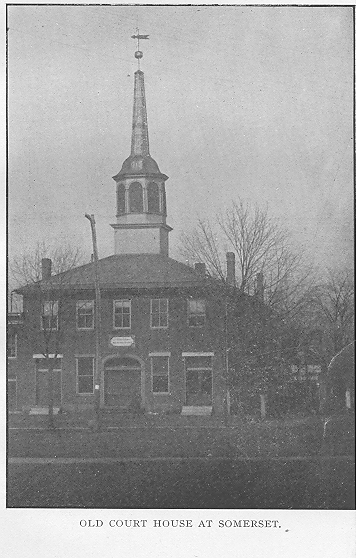
HISTORY OF PERRY COUNTY - 135
The Orphans' Home is a large commodious building that has been prepared to shelter quite a number of children. It is situated at the eastern edge of New Lexington and has been established about a dozen years.
The Underground Railroad.
"Many years ago on a dark, bitter cold night, if persons had passed the old M. E. Church in Deavertown, and observed closely, they might have seen dim lights within, and heard low, strange whisperings while the winds whistled mournfully around. the house and among the tombs of the dead. And if persons seeing and hearing this had become frightened and gone away without closer investigation, there would have been marvelous stories of a haunted house and churchyard, the secret of which, the death of two or three persons would have left forever unrevealed. But it was all very natural and easily accounted for."
The above is quoted from the New Lexington Tribune of some years ago. It was written by Thomas Lonsdale Gray of Deavertown. He was a descendant of Lord Lonsdale of North Yarmouth, England, and was one of the principal conductors on the famous "Underground Railroad." The picture shown is that of Mr. Gray and his home. The house has the same appearance as it had when it sheltered fugitive slaves.
While the highway of runaway slaves did not pass directly through Perry county, yet it was so near the Perry-Morgan line and many times altogether in the county, that she too can share in the glory of the "Underground." Between the years 1850-6o fugitive slaves were numerous. The lines of travel were well defined. Communities where a strong pro-slavery sentiment prevailed Were evaded. Stations were estab-
136 - HISTORY OF PERRY COUNTY.
lished at certain intervals and conductors were ever ready to assist in their flight. Deavert0wn seems to have been the convergence of two routes from the Ohio river. The most important of these was the one coming by the way of Pennsville, in Morgan county. Pennsville was a Quaker settlement. The other one came by way of Athens and followed the Athens and Zanesville road. This one passed through Portersville. From Deavertown the route extended to Zanesville. Roseville was not considered a healthful place and so they kept to the right. John Ball in Porters-vine made his home a stopping-place, while David H. Deaver, commanded the first one south of Deavertown, known as Station D.
The subterfuges resorted to, makes highly interesting reading. The evasion of slave hunters, the putting them on the wrong scent and the narrow escapes are thrilling to say the least. Hundreds of slaves were transferred over this "railroad" and many people yet remember the "knock at the door" and the dark shadow that was ushered into the attic to await the next move.
Morgan's Raid.
"Morgan is coming ! Morgan is coming !" This was the cry that startled the midnight air, in southern Perry, as a galloping horseman, like Paul Revere, rode over our hills to arouse the "country folk to be up and to arm." "Then there was hurrying to and fro" for the iron hoof of war was approaching. The silver spoons and the silver watch and the gold ear-rings, that were heirlooms in the family, were hidden behind the soap jar, in the dingiest corner of the smokehouse. And, Frank, the family horse, was suddenly aroused from his slumbers in the stall by the bridle
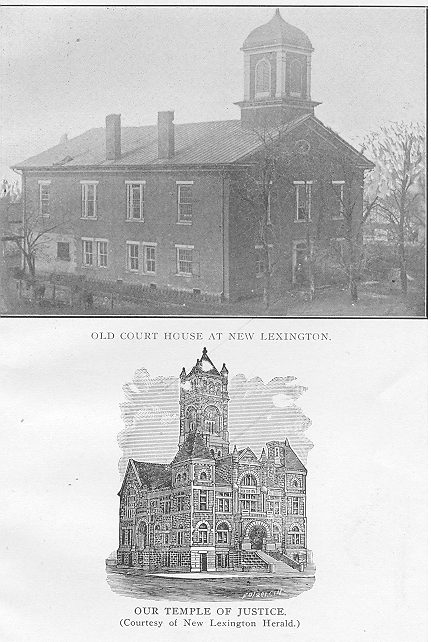
HISTORY OF PERRY COUNTY - 137
bit slipping into his mouth. He no doubt thought that now he would have to make a hurried run to New Lexington, Maxville or Oakfield for the doctor. But instead he was unceremoniously hustled down behind the barn, across ditches, through brier patches, to a remote ravine in the farthest corner of the farm, and tied to a sapling in a thicket, where he spent the remainder of the night in cogitation.
Morgan was indeed coming. What route he would take no one, knew. He was headed our way. Many stories were afloat as to his methods. The report generally was that he was robbing and burning everything in his pathway. A part of this was true. But when John Morgan, the Confederate cavalry leader, went through Perry county, he was not bent so much 'on devastation as he was to get out of the country. Fresh horses and food were the most that he wanted. He was in the enemy's country and his reception was a little warmer than he had anticipated. He had thought that there were only a few old men and boys left here. While it was true that the most of our able bodied men were in the service of their country, there was still a sufficient number here, to make it exceedingly interesting for him, even if the National Guard that was sent to Marietta, to intercept him were armed only with tin-cups. Morgan's original intention was to carry "grim-visaged war" into Ohio, but -by the time he had been chased across the state and had zigzagged and criss-crossed his path several times, he had changed his mind to a considerable extent.
Morgan had come into Ohio from Indiana, crossing the boundary at Harrison just north of Cincinnati. He was being closely pursued by General Hobson's cavalry. Hurridly crossing the- state through the
138 - HISTORY OF PERRY COUNTY.
southern tier of counties, he attempted to cross the river at Buffington Island in Meigs county. Gunboats had been sent up the river to intercept his crossing. Here on Sunday, July 18, 1863, was fought the only battle of the Civil War on Ohio soil. The Confederates numbered about two thousand men. Morgan, with eight hundred succeeded in crossing the river. Seeing that he could not get all of his army across, he, himself came back to the Ohio side and started toward the west. His intention was to get the gunboats to go down the river, when he would suddenly turn and cross before they would have time to come back again. At Harrisonville he turned south and reached the river at Cheshire in Gallia county. Still he could not effect a crossing. Turning to the west again for a dozen miles he suddenly veered toward the north-east. His object tow was to outrun the pursuing cavalry, and reach the Ohio river in the neighborhood of Wheeling before the boats could arrive. It was on this race between him and General Shackle-ford, that he passed through our county.
Morgan reached Nelsonville about ten o'clock in the morning. He burned some canal boats and rested his men till about two o'clock in the afternoon. He went only two miles more that day. He encamped for the night in a wheat field where a part of the village of Buchtel is now located. General Shackle-ford came into Nelsonville at four o'clock, six hours after the Raiders. His men and horses were dusty, tired and hungry. Morgan as he went along had taken the best horses and Shackleford was obliged to take what was left. Even with the Confederate force only two miles away, it was impossible to attempt their capture, after the four hours rest they had secured at
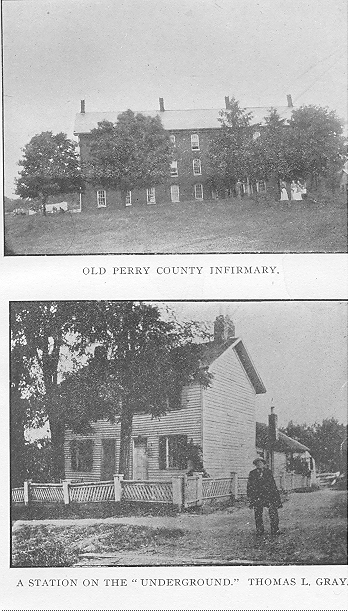
HISTORY OF PERRY COUNTY - 139
Nelsonville. The next morning when Shackleford reached the top of the hill, from where he had seen on the evening before, the enemy in camp, he now saw that during the night the dashing Morgan had slipped away. He had gone up the tributary of Big Mondaycreek, through where are now the towns of Orbiston and Murray, then crossing the Mondaycreek-Sundaycreek divide, struck our county in Section 35, Coal township, came down into the valley at Hemlock, followed the Sundaycreek Branch through Buckingham and reached Millertown sometime in the afternoon. Here he rested his men till six o'clock in the evening. He took some horses in the neighborhood of Buckingham. Four were taken from Squire McDonald, one each from Morgan Devore, Mr. Moore and Thomas Skenyon.
Shackleford reached Millertown during the night and camped on the ground where Morgan had rested his men in the afternoon. It can be seen that the Union General was here losing ground. His men were so completely exhausted and their horses were in such a condition that the progress was very slow. Richard Nuzum, ex-county commissioner of Perry county, went up to Millertown the next morning and found men sleeping all around. It was ten o'clock before the union forces left Millertown. Meanwhile Morgan had passed through where Corning now is, climbed the hill to the Chapel Hill Church, passed up to Porterville and then out of the county, camping for the night on Island Run in Morgan county. Morgan had pressed Henry Kuntz, a citizen of our county, into his service as his pilot: Several New Lexington men whose curiosity was greater than their prudence went out. on the trail of the Confederates. Suddenly they
140 - HISTORY OF PERRY COUNTY.
rode into the camp on Island Run. Two of them were captured. They were taken along, but were allowed their freedom somewhere over in Guernsey county. Morgan crossed the Muskingum at Eagles-port. At this place a furnace-man from Logan, who had joined Shackleford at Nelsonville, was shot by a sharp-shooter, while he was reconnoitering on the high bluffs above the Muskingum. General Shackelford captured Morgan near New Lisbon in Columbiana. county. The Confederate leader, was imprisoned for several months in the Ohio Penitentiary from which he made his escape.
One of Morgan's men fell behind in our county. He was captured and taken to New Lexington, where he attracted considerable attention. He was sent to Camp Chase, Columbus, where Confederate prisoners were kept during the war.
Morgan's Raiders took what they wanted, and if no objections were made to their wholesale appropriations, no one was molested. In closing this account we quote from Colborn's History of Perry county.
" A plucky woman of Monroe township, who was riding along the road gave the raiders a piece of her mind. They did not retaliate in words, but gently lifted the lady from her saddle and appropriated her horse. Dr. W. H. Holden of Millertown, then on a tour of visits to his patients, was promptly relieved of his horse, but was kindly permitted to retain his saddle-bags, which he carried the remainder of the way on his arm, as he trudged h0meward on foot. A farmer was hauling a load of hay along the road. His team was halted, the harness stripped from the horses in a twinkling, and there the farmer sat upon his load of hay, a much astonished and bewildered individual.
HISTORY OF PERRY COUNTY - 141
There was a wool-picking party at the house of a farmer ; quite a number of ladies was there and supper was just announced. Morgan's men came in uninvited, appropriated all of the seats, and remarked that it was very impolite to take precedence of the ladies, but that they were in a great hurry and could not afford to wait. What they left in the way of eatables was hardly worth mentioning."
Population of Perry County.
